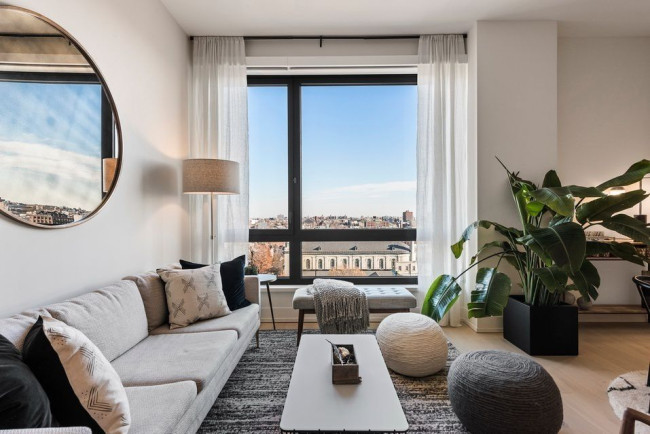Wallflower power: 12 tips for selling a NYC apartment that's been on the market too long
You were excited when you put your apartment on the market and thought it would sell quickly—within a few days, or a week. But weeks passed, and then months. Now it's been sitting on the market for more than 100 days. You're beginning to think, “What’s wrong with it?”
You're right to be concerned, because the longer a listing stays on the market, the harder it is to sell it. But 100 days isn’t so bad right now with the average Manhattan apartment staying on the market for 103 days, according to the latest Douglas Elliman report.
“Two to three months is doing well in a buyer’s market,” says Frances Katzen a broker with Douglas Elliman. “At five to six months, I would say 'OK, we need to do something.'”
What that something is, of course, is going to differ depending on the property. Talk to your broker for their insights and tell them to give it to you straight.
Has your apartment languished too long on StreetEasy? Do you want a fresh start -- for you and for your apartment? With the pre-marketing platform at New York City real estate brokerage Triplemint, you can quietly market your home before re-listing it publicly or committing to another six-month exclusive with a real estate agent. There's no charge to participate and no obligation to enter a traditional listing agreement at the end of the pre-marketing period if your place hasn't sold. Click here for more information.
“Accuracy is your best support system in being able to achieve a successful sale,” Katzen says, especially since the place didn’t sell right away.
Read on to find out what brokers recommend for moving a property that has lingered on the market.
1. Update the market analysis
One of the first things to do is ask your broker to analyze the data and try to determine why your property isn’t selling. It could be marketing, but most often it’s the price.
“The advantage we have these days is technology provides us with streams of data. We can track web page visits, days on the market, and correlate days on the market with the competition,” says Steven Goldschmidt, senior vice president and managing director at Warburg Realty. “We can use the data to see if it’s overpriced. If it’s not getting good traffic or web hits, it’s usually marketing. If there is traffic and showings but no offers, what’s wrong with it physically?”
Compass agent Takk Yamaguchi suggests looking at comparable units that went into contract in the last 30-60 days and compare the asking price per square foot to yours.
“If you’re asking $50-$100 more on comparable properties, buyers will walk to the others. If the analysis comes back with a lack of comparable properties going into contract, chances are the market is inflated and you should lower your price first and get ahead of the wave.”
2. Drop the price
Data analysis will confirm if the property is overpriced, which can be difficult for you to hear, as you want to get the most you can for your listing.
“The biggest thing is price. That’s what this market is coming down to,” says Nicole Gary, a broker with Keller Williams New York City. “There are nearly 40 [apartments] for sale in the W downtown, and if 20 units are all the same but at a lower price, buyers will look for the best deal, and they’re aware that there are good deals out there.”
Darren Sukenik of Douglas Elliman agrees: “There’s zero tolerance for overpriced properties. Eighteen months ago they were priced into the future. The market caught up. The price has to be a fair number based on fact—comparable sales, closed sales, real sales—not dreams or aspirational pricing. It’s not called seller’s value, it’s called market value, for a reason. If it’s not priced fair, it will sit.”
Gary says sellers usually think what they own is special, and it is—to you. But it may not be special to a buyer. “They have to understand a buyer may not like the renovation they did.”
She also notes that a price drop will register as a change on the listing sites. While that will not restart the “days on market” counters, it will refresh the listing and have it pop up higher in search results.
3. Visit the competition
If you're reluctant to budge on your price, ask your broker to take you to apartments you're competing with.
“Visit open houses in your building and neighborhood and see where the competition is priced,” Yamaguchi says. “It’s a wake-up call to some sellers viewing their neighbors' homes only to find out that similarly priced homes have far superior bathrooms, kitchens, fixtures, etc.”
Ari Harkov, a broker with Halstead, had clients with an offer they felt was too low. So he showed them everything else on the market in their price category, and they realized they were overpriced and decided to take that offer after all. “Everyone thinks their home is worth more than it is, and seeing what is out there is helpful,” he says.
4. Revamp the marketing
If it’s not the price, then it could be the marketing. Make sure your broker is on top of these various tactics.
Technology offers tremendous insight at who is looking at a property. Some newspaper sites and portals can tell a broker what time people are looking at a listing,” Goldschmidt says. “This is when marketing comes in. Someone looking for a two or three bedroom apartment is more likely to look at 10 p.m. after the kids are asleep.”
Sandy Scheinman of the Nematnejad Scheinman Team at Douglas Elliman suggests “increasing marketing efforts with a larger online presence, and direct mailing to neighborhood buildings.”
Harkov says in summer especially, Sunday open houses can be hit or miss. “Do a weekday evening open house and get better attendance from people who are traveling on the weekends,” he says. “Open houses are important for any property up to $4 million.”
You can also “rewrite the description copy to give it a new energy, and switch the pictures around on the listing so it looks different,” recommends Adam Taylor, managing director at BOND.
5. Have your broker reach out to other brokers
Multiple brokers said to have your broker check in with their colleagues who might have a buyer that could be a fit.
“Have a broker open house,” Taylor says. “The other brokers in your community are who you’re selling to first. Often they’re bringing you the buyer. You’re not just selling to potential buyers. People forget that. [Brokers] are pretty high on totem pole on importance of getting an apartment sold.”
Gary adds to make sure your broker lets others know of any price changes or renovations. “Get that out there to as many people as possible,” she says.
Also try to have your broker get market insights from the agents of the top five competing apartments, says Barbara Ireland of DJK Residential. “Or [have them] contact agents that have closed deals recently in the building or area for feedback on any obstacles they encountered.”
6. Declutter and make minor updates
After price and marketing, condition is the next most likely reason why a property might not move. (Read more on how to sell an apartment “as is.”)
“Keep the apartment organized. Declutter and make it look as much as a showroom as possible,” Taylor says. “Reorganize the closets—put in order by color. Have the pants together, the dresses separately. Rearrange the furniture, paint a wall a different color. Prepackage anything you won’t need. ‘If in doubt, throw it out,’ says my grandmother.”
Gary suggests doing renovations, if possible. “Renovate the kitchen, then do the photos again,” she says. “If there’s no money or wherewithal for a renovation, I’ll call an architect and designer and bring them in to do costs for a budget, mid-range, and high-end renovation.” She’ll have renderings and a guide recommending even what appliances to buy, “so potential buyers can see those and know what it will cost them at the end of the day.”
7. Take new photos with better angles
Whenever you’ve made a change to the apartment, take new photos. Even if you didn’t do much, it helps refresh the visuals.
“Have the photos enhance the strongest features of the property and/or the view or location,” says Beth Benalloul, an agent with Corcoran.
The goal is to create a different story to prospective buyers. “You have about 30 seconds to grab a viewer because there are so many choices online,” Katzen says. “Change the angles. You really need a money shot.”
8. Stage or restage the space
Several agents suggested staging, if it’s in your budget. This especially helps if your furnishings are dated or if you've already emptied the space.
Benalloul says to bring in a stager to update and neutralize the space, and follow it with new photos.
“The home needs to be furnished to make it feel larger,” says Bevan Versfeld of DJK Residential. “An empty apartment looks even smaller and makes it more difficult for the potential buyer to visualize living there.”
9. Create an event
In addition to open houses, your broker could get creative with showing the space off.
“If there’s an outdoor space, have a champagne toast at sunset. Or hold a breakfast,” Taylor says. “Anything with food or drinks in the situation will get more attendance.”
Jessica Kaufman, a broker with Citi Habitats, agrees and says brunch is a good idea,. “If you get everyone together, it makes the place more desirable. It’s like being at a party—the more people you have around you, the more people will want to talk to you,” she says.
She also suggests you have your broker do viewings by appointment only. “You have to create buzz. If they're available seven days a week, no one wants to see them. It’s very much like dating.”
10. Offer concessions
Benalloul suggests offering a concession depending on what the stumbling issue is with the apartment. “For example, if there is a high maintenance, offer a maintenance rebate for a year, or if the apartment needs work, offer a construction credit at closing.”
11. Take it off the market
This tactic can work while updates are made to the property or new photos are being taken. It also can help reset the “days on market” counter on third-party listing sites that let buyers know how long a place has been for sale. But the sites all have different rules about how long a place needs to be off the market in order to reset the counter. For many it’s as high as 90 consecutive days.
You might have a broker that tries to game the system, by changing the apartment number, say from 5C to C5, but some sites have rules in play to prevent this type of manipulation.
“But [the counters] are not always as accurate as people think,” Kaufman countered. “[The companies] don’t always update their feeds regularly.”
Still, even with the counters still ticking, “If you do lower the price and pull the property for a few weeks then re-list it, it comes on as a fresh listing and lower price point,” Benalloul says.
Also, you can’t erase a property’s history. “Even if an agent takes a property off the market for 90 days and puts it back on the 91st day, you can still go to the bottom of the screen and see it was off the market for 90 days,” Taylor says. “Any smart consumer will do that.”
12. Rent it out and wait for a better market
A couple agents recommend renting the space if it hasn’t sold.
“It would be a quick strategy to a delayed sale,” Versfeld says. “In some cases, the renter could become a potential buyer at the end of the lease.”
And don’t give up.
Some people will see the days on market and think a property is stale, but it’s not, Taylor says. “There’s one buyer for that apartment, and you have to wait for that one buyer to buy it. It’s a major purchase and takes a lot of money. And people take the time and effort to make sure it’s the right decision to make."
You Might Also Like



























